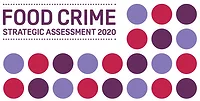FSA Reports on the Changing UK Food Crime Landscape Since 2020

The UK Food Standards Agency (FSA) and Food Standards Scotland (FSS) have published the 2024 Food Crime Strategic Assessment, which explores the range of factors influencing food crime in the UK. Since the last strategic assessment in 2020, the UK food supply chain has faced significant disruptions, causing the food crime landscape to change and creating new opportunities for fraud.
The assessment outlines several emerging threats, including the involvement of insiders within the food industry using their knowledge to commit and conceal crimes. The report notes that both domestic and international actors engaging in food crime, and while many threats identified in 2020 persist, new challenges have emerged due to economic conditions, geopolitical events, and changes to food-related legal frameworks.
Key food crime methods include misrepresentation, adulteration, substitution, unlawful processing, waste diversion, theft, and document fraud. Certain types of food crime were linked to specific commodities; of note: red meat and poultry mislabeling/misrepresentation, waste diversion of red meat and poultry animal byproducts, and the illicit handling or importation of lamb and pork, and adulteration and misrepresentation of imported goods.
The report also underscored that certain supply chains are at high risk for upstream authenticity issues, requiring domestic vigilance and monitoring, specifically: olive oil, honey, and herbs. Additionally, an overall rise in the availability of illicit imported goods, known as "grey market goods,” was highlighted.
Other commodity-food crime themes identified in the report include:
- Pork: Misrepresentation of quality, date, and country of origin; as well as livestock theft
- Beef: Fraudulent entry of cattle to the food chain enabled by document fraud
- Lamb: Livestock theft, unlawful production and distribution conducted by an organized crime group, adulteration, and substitution
- Chicken: Misrepresentation and waste diversion
- Raw pet food: Unlicensed and unapproved production and handling of raw pet food generated from animal byproducts
- Shellfish: A decrease in illicit onshore hand gathering, with an associated drop in reporting on document fraud, substitution, and adulteration
- Fish: A low level of fish substitution in foodservice, as well as the threat of misrepresentation of country of origin for Russian fish
- Alcohol: Counterfeiting, as well as a low level of substitution in the hospitality sector
- Sustainable products: A low level of casual and unsubstantiated use of organic terminology and claims.
Regarding the foodservice sector, reports of illegal activity involve a broad spectrum of crime types and commodities. Sampling activities have identified vulnerabilities in takeout foods regarding substitution of heavily flavored or processed proteins.
Additionally, the reclassification of 2,4-dinitrophenol (DNP) as a poison in 2023 shifted the responsibility for its regulation to UK law enforcement, and it continues to pose a public health risk. The report stresses the importance of collaboration between FSA and its policing partners to address this and other food fraud risks, especially during times of economic hardship.
Moving forward, over the next 12–24 months, FSA will closely monitor food crime threats tied to evolving border controls.
Looking for quick answers on food safety topics?
Try Ask FSM, our new smart AI search tool.
Ask FSM →









